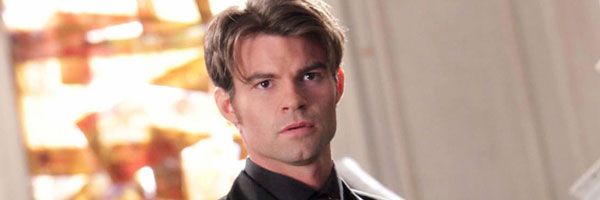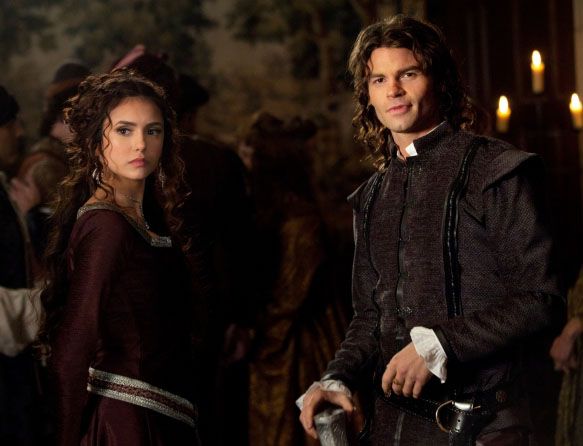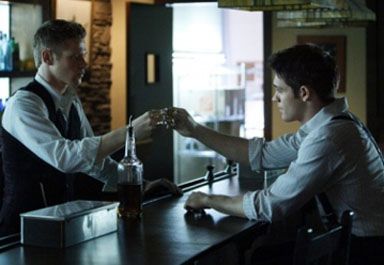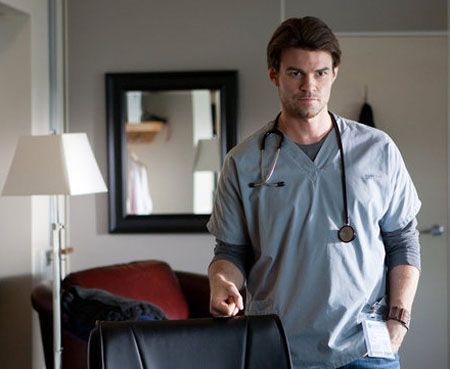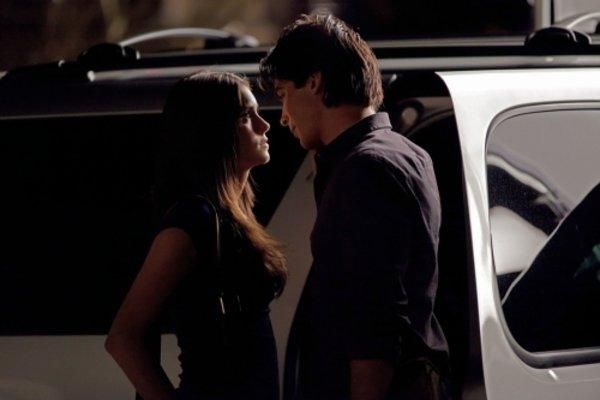With The CW series The Vampire Diaries wrapping up its third season, just like with every season of the popular drama, the lives of every character will be in jeopardy, decisions will be made that will change everything, and it’s pretty likely that the hearts of at least some of the residents of Mystic Falls will be broken, before it’s all said and done.
Since his first appearance on the show, original vampire Elijah has become an increasingly popular character among the loyal viewers and, during this recent exclusive interview with Collider, actor Daniel Gillies talked about how he originally got involved with The Vampire Diaries, what drew him to the role, how immensely lucky he feels that the role has turned out the way it has, what he’s enjoyed most about playing Elijah, and how sweet and supportive the fans have been. He also talked about his role as a hotshot young surgeon on the NBC medical drama Saving Hope, premiering on June 7th, being able to juggle both shows if need be, and writing and directing his first independent film, the drama Broken Kingdom. Check out what he had to say after the jump.
Collider: How did you originally get involved with The Vampire Diaries? Was Elijah always the character that you had auditioned for?
DANIEL GILLIES: Yes, it was. I went in at the end of 2010. I thought I had done a pretty good job, but there were a lot of kids who had auditioned for it. They said, “You did a good job,” but I didn’t hear anything for awhile. I think it was four to six weeks after I had auditioned that I got the role. They said that they liked my audition, but that they were going to look for an older actor, which actually made sense to me for the role. I thought it should be played by an older actor. Elijah seems older.
Was this a show you had been familiar with when you auditioned, or did you catch up once you had been cast?
GILLIES: The truth is that it wasn’t a show that I knew. That’s no insult to the show. I just don’t watch television. I tend to watch movies. If I watch anything, I’m usually watching animation. I’ll watch South Park. And, I love Children’s Hospital so much. It’s the silliest show on TV, but I love it. But no, I was not familiar with The Vampire Diaries at all, although I did know Ian Somerhalder because he and I did a movie together in 2005. I was aware that Ian was on the show and that it was doing really well. And I also knew Paul Wesley from Canada. I met him about 10 years ago in Vancouver, when his name was Paul Wasilewski. I remember Paul because, while I was in Canada, I was working as a waiter, trying to make my way before I got some acting work in Canada, and Paul was not only a gentleman at 19, but he also tipped me really well when he left the restaurant that I was working at. I think he admired the fact that I was an actor trying to do my thing, but I was still waiting tables.
What was it about this character that appealed to you?
GILLIES: I’m not George Clooney, so I can’t just pick and choose. I take roles where they occur. The honest answer is that I needed the money. I had taken three years off of acting, at that point, to go and make my own movie and pursue that, so that left me about $110,000 in debt. And so, I just took everything I could. I took a bit role on True Blood. I took a role on NCIS. I took a role on The Glades. I did 17 or 18 episodes of television in 12 months. I just took everything because I needed to make my way out of the debt. Luckily, I was blessed to be able to do that. Not everyone can do that, so I’m immensely grateful for that. I’m also immensely grateful that all the shows that I did were terrific shows that gave me a good degree of visibility, not the least of which was The Vampire Diaries. But, in terms of what drew me into the role, I was just trying to make a buck. I was just trying to do whatever I could to get another role. It’s not very romantic to answer that way, but it’s the truth.
This role has turned into a dream role, but do you feel lucky that it’s become what it has, since you didn’t know you’d be sticking around for as long as you have?
GILLIES: I’m very grateful. There are any number of variables that can create or destroy a great role in anything, in the same way that there are any number of variables that can devastate or triumphantly brandish a movie or an entire film narrative or a novel or a song. I just feel immensely lucky that the role was written the way it was and that it was a degree of energy that people seemed to respond to.
At what point did you learn that you would actually be one of the Originals and that they would play such a big part of the storyline?
GILLIES: In the very beginning, they implied that he was one of the oldest around. I knew very early on, if not within my first couple of episodes, but I didn’t know that I was going to be Klaus’ brother and I don’t believe the writers did either. If they tell you that they did, they’re lying ‘cause they didn’t really know. No, I think they kind of knew. They had an idea.
What’s it been like to go from playing a character who wasn’t really supposed to stick around long to now being one of the viewers’ favorite characters on the show?
GILLIES: It’s immensely gratifying. I don’t control that. I don’t understand it. I’ve never had such universal love from a fandom. It’s very odd for me. I’m just so grateful. The TVD supporters, are the most loyal, lovely fans of any show, ever. I almost feel, in a sense, that they’ve ruined me because I know that I’m going to go on to do other shows, where I play other roles that may or may not be as popular, and I’m never, ever going to be able to recreate the kind of support, love and loyalty that they’ve demonstrated. They’re so sweet, and they’re so eager to get to know you and support you. I don’t understand it.
It’s interesting because there are places you can go in the world where the show is really popular, but you wouldn’t think it. You’re like, “Wow, it’s huge here?!” For example, I was in Thailand and the kids there love that show, but there it’s cultural and they wouldn’t approach you until they felt comfortable, which basically means when they’re drunk. When the kids get drunk, they come up and say, “Hey, we love the show!,” which is really sweet. But then, I discovered that the show wasn’t even playing in Thailand. They were actually downloading the show. If it does play, they’re a year behind, but all the kids watch it through the internet. I feel like such an old man saying that, but it’s true. It’s just amazing how devoted they are to it. And, I just love this cast, too. I feel like I’ve made some great friendships.
What have you enjoyed most about playing this character?
GILLIES: Well, I’m still learning from him. As lovely as people are to me about my performance, I’m still a huge critic. I like very little of what I ever do. I’m not kidding. I think of Elijah’s scenes, I’ve liked maybe three or four of them, of all the ones I’ve done. That’s scenes that I’ve actually walked away from and gone, “You know what? That’s good. I nailed it.” You don’t control it, but what you do control are the elements. What I’ve liked about him the most is how much he’s taught me, as an actor, and how much this role has taught me about playing this style. It’s not naturalism. You can be deceived into thinking The Vampire Diaries is naturalistic. It’s not. It’s a magic realism. It’s actually very heightened, and you can fall victim to making these performances so real that you actually lose your character a little bit. I’m still learning how to balance that. What I value the most from playing Elijah is how much he’s taught me, Daniel, about being an actor.
What did you think when you found out that the writers of the show had come up with the plan to bond all of the Original siblings together? Were you shocked about that?
GILLIES: You never know what’s going to come from them. I just started suspecting, “Either we’re all going to die, or some of us are going to find a way to evade this peril.” But, it didn’t look like it was going to happen anytime, in the near future. Every week, it’s life and death, so to be honest with you, I was not shocked. It’s Julie Plec’s obsession with family. I love that that’s her great aria, and I love that she’s really devoted to the study of family, and identifying one sense of purpose and never violating your personal code, in order to fight for a dream.
Where do you think Elijah’s head will be at, when he finally comes back?
GILLIES: That’s a really good question. I’m just wondering if this isn’t all a rouse, with him leaving and saying, “I’m deeply ashamed. I’m disgraced.” I feel like he went away to figure something out. I wouldn’t rule out the idea that he might have gone away to strategize, or to take actions that we don’t even know about.
Don’t you think he’s the most level-headed of the Originals?
GILLIES: Which is disturbing because he’s kind of a murderer.
With how devious all of the Originals have been at times, are you surprised with how vocal the fans have been about wanting a spin-off?
GILLIES: I know! That’s another good question. I like that you’re not asking the traditional route of questions. I think it makes a lot of sense. Joseph [Morgan] has become a really good friend of mine, and Claire [Holt]. I didn’t have as much experience with the brothers, who I love and think are great. But, it really does feel like it’s own energy, and it’s own creepy, older thing. It doesn’t surprise me. I just don’t know whether or not it could be in the same vein as The Vampire Diaries, if you were to do a spin-off. That’s the only thing. They seem, to me, to be a lot more ruthless, which would almost require a different rating. There’s a suggestion that that family are very dark and that would require a whole new universe, and a much more dangerous universe.
What was it about the medical drama Saving Hope that attracted you to that show?
GILLIES: I was on break from The Vampire Diaries. I was on hiatus. They hadn’t made me a series regular. There was talk about it, but I was free to go and audition for other things. Truthfully, I thought it was a very good pilot. I went in and met the director, David Wellington, and one of the main producers in my audition in L.A., and I just remember thinking immediately, and I thought, “That guy is the coolest director I’ve ever been directed by,” and he only directed me for an audition. He’s the best director I’ve ever worked for, and I knew it then. I really hoped that I got the job, but even if I hadn’t gotten the job, I was almost going to contact him and say, “Look, man, if you ever do a movie, let me put myself down on tape for it. If you ever do anything, I’d love to work with and for you.” As it happens, I ended up getting the job.
It’s just so exciting to meet people like that. And then, when I got to set with Erica Durance of Smallville and Michael Shanks from Stargate, they’re actors who are so experienced and so good. The show just went from strength to strength. To watch really great actors under David Wellington’s expert navigation is extraordinary. I’ve seen the pilot and it’s just such a good show. It’s such an amazing-looking show and I’m excited, in a whole new way. It’s a real departure from Elijah on The Vampire Diaries. It’s going to be interesting to be playing actual people in an actual world. It’s going to be interesting for me to be able to be a person, as opposed to someone who’s immortal with shades of being a person.
What happens, if you have to juggle both shows?
GILLIES: I can still do both. I finished all 13 episodes, just when The Vampire Diaries was getting started again.
What led you to write and direct your own feature film, Broken Kingdom?
GILLIES: I do like to work pretty hard. I just started writing it at about 31 because I figured that, if I didn’t do it by the time I was 35, I’d probably never make a movie. It was just one of those things where I thought, “If I don’t do this now, I might never do this,” and I might not be really grateful for having done it until my 40s. Now, at 35, I can look at it and think, “Okay, we made it to a little festival, we won some awards and it’s a sweet, beautiful little film, but it’s not the climate for a film about a prostitute black girl from the streets of Columbia. Nobody wants that film. There are no special effects in it. It doesn’t star a white male in his late 20s, who’s got muscles to his eyeballs. It’s a movie about real people. The States, especially, does not want this film, at the moment. The festivals, which have gotten more and more commercials, absolutely abhor the idea of actual indie filmmaking anymore. They’ve become more commercial than the Academy Awards. It’s fascinating to me.
The only way that film was going to be made with me in it was if I did it myself. The only way that film was going to be made at all would be if I did it. It’s a sad wasteland out there where a handful of directors are able to do what they want to do, and there’s nobody really truly supporting independent filmmakers anymore. It’s just dire. There’s a lot of bad filmmaking, and there’s a lot of people worshipping some terrible filmmakers. It’s a waste of all of our time, if you don’t feel anything. We are an age of YouTube kids. We don’t care so much anymore. And, Broken Kingdom is one of those movies that’s going to be like pushing a boulder up Mt. Fuji to get it out in the universe.
It’s about marketing and how you can market something, and unfortunately it’s going to be one of those things that I don’t know how to market. The performances in it and the cinematography are great. I’m just so delighted with this film. It’s touching and it means something, but people just don’t want to be challenged. I understand the desire to be entertained, but it’s not mutually exclusive. People never regret when they come out of a movie and they’ve been crying. I think people need it. That’s why people have the theater and live music, which is dwindling as well. I think people like to go see things and have an emotional, transcendent, universal human experience, but so often we’re like, “Let’s go watch Green Lantern,” which we all know is just not going to do anything for our souls.

